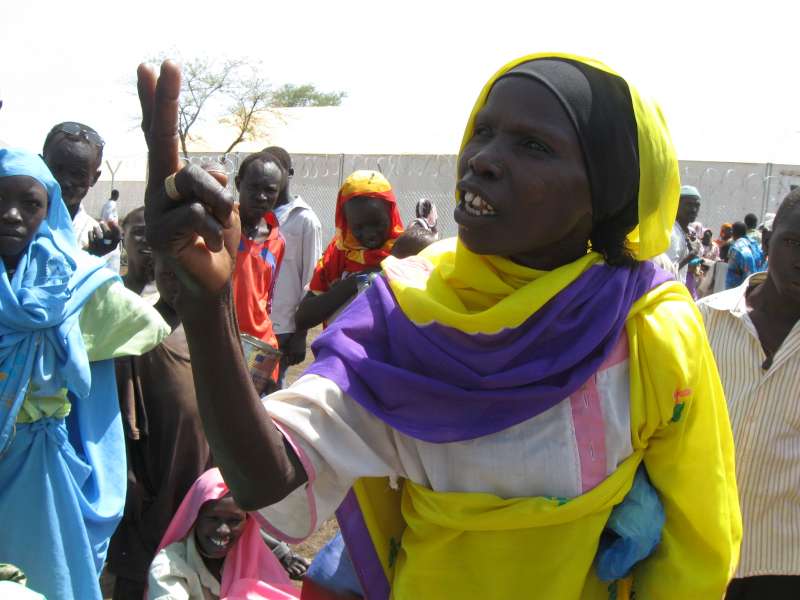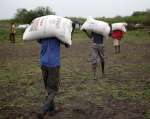- Text size
 |
|  |
|  |
| 
- Français
Food shortages in South Sudan refugee camps stoke mounting anger
News Stories, 7 May 2014
YUSUF BATIL REFUGEE CAMP, South Sudan, May 7 (UNHCR) – After queuing for food in South Sudan's Yusuf Batil Refugee Camp, 25-year-old Sura Sirad is clearly unhappy with the meagre ration: two cups of lentils, a cup of oil and about two-and-a-half kilos of sorghum for her family. There's not even any salt.
"This food will last my family two days at most," the angry mother of four exclaims. "The last time we had a proper meal was in February. Since then, it's been a 10-day ration here and a five-day ration there, with long weeks of nothing in between!"
The transportation of vital aid to Yusuf Batil and other refugee camps in Upper Nile State's Maban County has been hindered by insecurity and fighting along supply routes. Unable to deliver critical food supplies, the World Food Programme and its partners, including UNHCR, were forced to distribute reduced rations to the tens of thousands of refugees from Sudan in Maban in March and April.
"We have to continue picking lolop leaves to cook because there is nothing else," Sura says, echoing the mounting frustration and anger of many other women here, who complain to humanitarian aid workers about the food shortages. The lolop tree is prevalent in the area and its leaves are edible but bitter in taste. Some young children get stomach aches after eating it.
It's an issue that UNHCR, the World Food Programme and their partners take very seriously. "We humanitarian actors share the refugees' frustration," stresses UNHCR official Adan Ilmi, adding that renewed fighting since mid-December between South Sudan government and rebels forces had made it very difficult to transport aid.
In a joint statement last Friday, UNHCR and WFP called on the rival sides to ensure safe humanitarian access for aid agencies to vulnerable displaced people, including the 125,000 Sudanese refugees in Maban County. The UN partners said there was still time to deliver substantial amounts of aid by road, rather than costly airlifts, before the rains made roads impassable.
Sura is blunt about the situation of the refugees in Yusuf Batil, who fled t South Sudan before the fighting blew up in December. "We are helpless," she says. "We have no land to cultivate. We cannot cut trees to sell because it is illegal. We don't have the skills or the education to get jobs."
She admits that she has thought of going back to Blue Nile state in Sudan. "At least I have land in Dereng, where I can cultivate food for my family," she explains. Some people have already returned, notes UNHCR's Ilmi, who heads the Bunj sub-office. "We are receiving reports that up to 2,000 refugees have returned from the Maban camps to war-torn Blue Nile state." He says this is a worrying trend, adding that Blue Nile is "itself food insecure due to continuing conflict."
In the Maban camps, refugees are supplementing food aid with wild roots and leaves. Others are selling or bartering items like soap in markets and neighbouring villages in exchange for food.
"Soap is of vital importance during the rainy season, when the highest standards of hygiene are necessary to prevent the outbreak and spread of disease," says Ilmi. "Regrettably, refugees are selling their soap and vandalizing sanitation installations, or selling plastic sheets, poles and other materials intended for latrine construction."
The UN refugee agency and its partners fear that continuing food shortages will adversely affect the health and nutritional status of the refugees. Children and older people as well as pregnant and lactating women are particularly vulnerable.
"We can still prevent further deterioration of this situation if the parties to the conflict would facilitate safe humanitarian access and enable us to bring food and other critical supplies to Maban," says Ilmi. "On the positive side, we have received reassurances from WFP that additional food stocks will be flown to Maban in the coming days," he adds.
Sura hopes he is right. "We want to believe the UN will fix this problem soon. We cannot go on living this way," the young woman warns.
By Pumla Rulashe in Yusuf Batil Refugee Camp, South Sudan














































